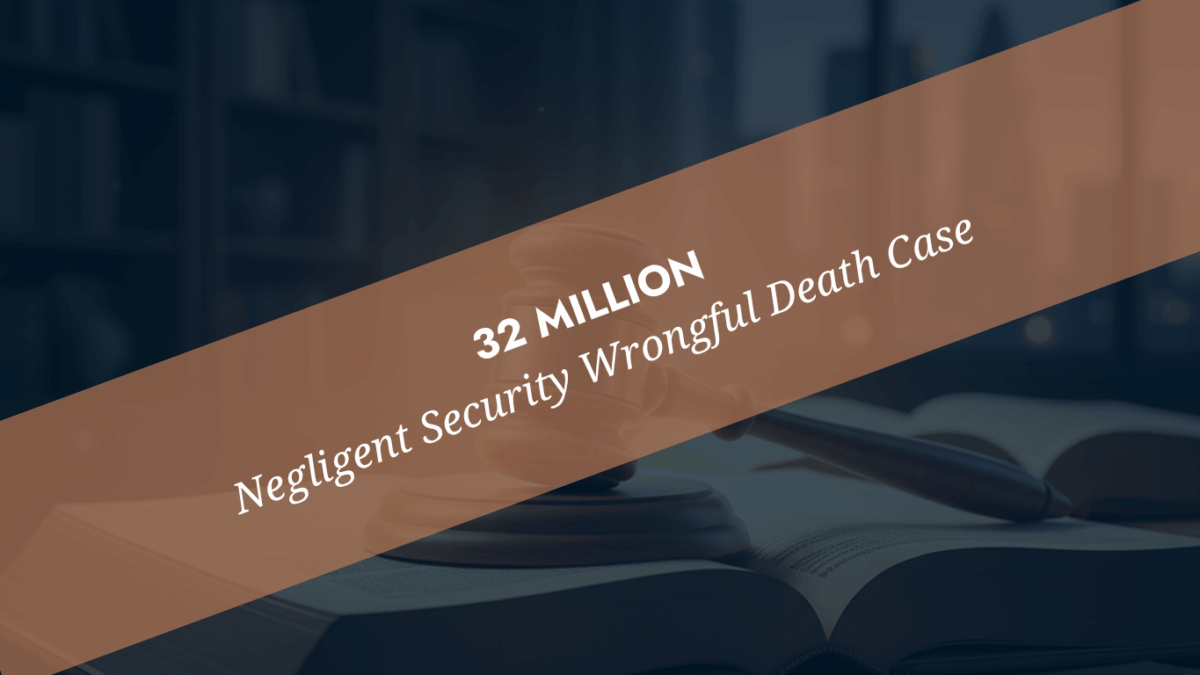
Introduction: Justice for the Amiri Family
On October 13, 2025, a Dallas County jury returned a $32 million verdict in a negligent security wrongful death case, sending a strong message to businesses that disregard safety in high-crime areas.
The verdict was secured by Bennett Legal and Miller Copeland on behalf of the family of Mr. Amiri, a devoted husband, father, and Afghan immigrant who had served as an interpreter for U.S. forces before resettling in Dallas.
The jury found multiple companies and individuals liable for creating and allowing dangerous conditions to persist at the intersection of Ferguson Road and I-635 in Northeast Dallas; a well-documented crime hotspot.
“This verdict is about accountability,” attorney Charles Bennett stated. “For seven years, this family has waited for justice, and the Dallas County jury made clear that when businesses neglect security and human life is lost, our community will not look the other way.”

Understanding Negligent Security Under Texas Law
In Texas, negligent security is a legal claim that falls under the broader category of premises liability. It applies when a property owner or business fails to take reasonable steps to protect people from foreseeable criminal acts by third parties.
Under Texas premises liability law:
- Duty of Care – Owners and occupiers of property must act as a reasonable person would under similar circumstances to keep the premises safe.
- Foreseeability – Criminal activity must be foreseeable based on prior similar incidents.
- Breach and Causation – Failing to provide adequate security must directly contribute to the harm suffered.
Key legal precedent: Timberwalk Apartments Partners, Inc. v. Cain, 972 S.W.2d 749 (Tex. 1998), where the Texas Supreme Court outlined the foreseeability factors in negligent security cases.
How the Amiri Case Met the Legal Standards
To succeed in a negligent security claim in Texas, plaintiffs must prove:
- The property owner owed a duty of care.
- The owner breached that duty.
- The harm was foreseeable based on prior criminal activity.
- The breach caused or contributed to the injury or death.
In this case:
- The intersection of Ferguson Road and I-635 had a well-documented history of violent crime.
- Businesses and individuals in control of nearby properties ignored persistent gang activity.
- There was an absence of effective security measures — including lighting, security patrols, and surveillance coverage — despite repeated violent incidents.
Wrongful Death Claims and Negligent Security in Texas
The Texas Wrongful Death Act (Tex. Civ. Prac. & Rem. Code Chapter 71) allows certain family members to recover damages when a death is caused by wrongful acts, neglect, or carelessness.
In negligent security wrongful death cases, eligible family members include a surviving spouse, children, and parents.
Damages may include:
- Economic losses – lost wages, benefits, and financial support.
- Non-economic losses – loss of companionship, mental anguish, and emotional suffering.
- Exemplary (punitive) damages – when gross negligence or willful misconduct is proven, to punish and deter similar conduct.
The $32 million jury award in this case reflects both the magnitude of economic losses to the Amiri family and the jury’s recognition of the defendants’ neglect.
Joint Liability Among Multiple Defendants
Texas law allows more than one defendant to be held responsible for wrongful acts.
Under the Texas proportionate responsibility statute (Tex. Civ. Prac. & Rem. Code Chapter 33), if multiple parties contribute to a death or injury, each can be assigned a percentage of fault and required to pay their share of damages.
Here, the jury found both corporate defendants (business property owners) and individual actors liable for allowing crime to flourish.
The Role of Appellate Strategy in Trial Success
A notable aspect of this case was the early integration of appellate strategy.
Appellate counsel Matt Kita worked alongside trial counsel from the start — ensuring the legal theories, admissibility of evidence, and procedural steps were positioned to withstand any appeal.
This proactive approach helps safeguard jury verdicts from being overturned due to legal technicalities or procedural missteps.
Safety Lessons for Texas Property Owners
This verdict is a stark warning to businesses, landlords, and property managers: ignoring crime risks can lead to catastrophic liability.
Best practices to avoid negligent security claims:
- Conduct regular security audits.
- Install and maintain adequate lighting.
- Use surveillance cameras and ensure they are functional.
- Hire trained security personnel in high-crime areas.
- Keep detailed records of prior incidents and response measures.
- Cooperate with law enforcement on criminal prevention strategies.
What Families Should Do After a Negligent Security Tragedy
If your loved one is harmed or killed due to unsafe property conditions:
- Preserve evidence – photographs, video footage, 911 calls.
- Obtain police and incident reports.
- Identify witnesses and secure statements quickly.
- Contact an experienced Texas negligent security attorney — these cases are complex, and evidence can disappear quickly.
⚠ Deadline Warning: In Texas, you generally have two years from the date of death to file a wrongful death lawsuit. Missing this deadline can bar your claim permanently.
Frequently Asked Questions About Negligent Security in Texas
Q: Is a business always responsible for crimes on their property?
No. Liability exists only if the crime was foreseeable and the business failed to take reasonable steps to prevent it.
Q: Can gang activity increase a property owner’s legal duty?
Yes. A documented history of gang violence increases foreseeability, which may increase the owner’s duty to improve security.
Q: Can I sue multiple businesses for one incident?
Yes, if each party played a role in creating or failing to address the dangerous condition.
Q: What damages can my family recover?
Economic costs, medical bills, lost wages, diminished earning capacity, pain and suffering, emotional distress, loss of support and consortium, and in some cases punitive or exemplary damages.
Closing: Justice Through Accountability
The $32 million Dallas verdict is more than a financial award — it’s a statement from the community that safety matters.
Bennett Legal and Miller Copeland’s work, alongside appellate counsel, ensured that justice for the Amiri family was both won and protected from being undone.
If your family has suffered due to violent crime on unsafe property, you deserve answers, accountability, and justice.

